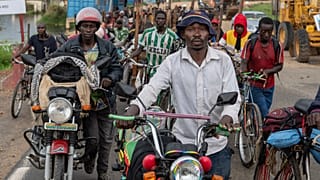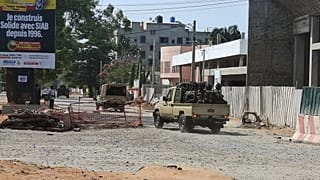Business Africa
This week in Business Africa: Rwanda slams the door on ECCAS, denouncing the bloc as ineffective and politicized; in Ngong, northern Cameroon, peanuts, a local agricultural treasure, struggle to reach their full economic potential; and in Kenya, bitcoin makes its way into Nairobi’s slums, offering a new path to financial inclusion.
Central Africa: What Lies Behind Rwanda’s Departure from the ECCAS?
On June 8, 2025, Rwanda announced its withdrawal from the Economic Community of Central African States (ECCAS) after 16 years of membership. This decision, driven by internal political tensions within the regional bloc, highlights the structural difficulties of an organization whose economic integration remains limited.
According to Cameroonian economist Eugène Nyambal, “What happened is that due to the conflict between the DRC and Rwanda, the DRC appealed to ECCAS to ask Rwanda to stop supporting rebels in eastern Congo. It turns out that the DRC’s position gained more sympathy from the bloc’s member countries.” Rwanda, which had hoped to assume the rotating presidency, was ultimately refused, as the mandate of President Obiang Nguema was extended.
“This irritated Rwanda, which had already expressed concerns about ECCAS’s effectiveness,” explains Nyambal.
The consultant recalls that Rwanda criticizes the bloc for weak performance in regional integration:
“I have worked on ECCAS and, compared to ECOWAS or SADC, it is one of the regions where integration progresses the least. The CEMAC sub-bloc is better structured, but at the ECCAS level, the dynamism is insufficient. There is a lack of strong initiatives to advance integration.”
Nyambal points to several factors: “There is a problem of political will and institutional capacity. ECCAS struggles to generate joint projects, and some projects funded by donors have taken up to nine years to be implemented, although they were planned for three or four years.”
Regarding the impact of Rwanda’s withdrawal, Eugène Nyambal remains measured: “I do not think this will create a major shockwave, because in this region, the ‘resource curse’ means each country can largely survive on its natural resources. This limits the need for strong economic integration, unlike ECOWAS or East Africa where trade is essential for development.”
Nevertheless, Rwanda’s departure could complicate the use of the Dar-es-Salaam corridor, key for Rwandan supply chains, and disrupt sectors such as air transport and telecommunications. More broadly, ECCAS, whose intra-regional trade accounts for barely 5% of African trade, sees its role questioned in building a dynamic regional market.
In conclusion, Eugène Nyambal stresses the need for ECCAS to reinvent itself: “For the region to progress, political and institutional challenges must be overcome, and member states must be convinced that their future lies in closer cooperation. Without this, the bloc will remain on the sidelines of Africa’s major economic integration dynamics.”
Kenya: When Bitcoin Enters the Slums
In Kibera, one of Africa’s largest slums, bitcoin is gradually establishing itself as a financial alternative. Thanks to the Kenyan fintech AfriBit Africa, unbanked residents receive subsidies and make daily purchases using cryptocurrency. Garbage collectors, traders, vegetable sellers, hundreds have already adopted this system.
An inclusive revolution, yet still fragile in the face of regulatory and digital access challenges. In the narrow streets of Kibera, bitcoin payments are slowly replacing cash. This initiative disrupts traditional norms and redefines the future of grassroots finance.
Cameroon: Ngong Peanuts, an Underused Bonanza Despite Its Potential
In the town of Ngong, northern Cameroon, peanuts are more than just a crop, they are a regional economic driver. With up to 180,000 tons produced annually, this flagship product supplies local markets and neighboring countries such as Nigeria and Chad.
However, due to a lack of mechanization and effective support, a large portion of production escapes the formal economy. A massive agricultural opportunity that remains undervalued.





![Cyber Africa Forum highlights Benin's bold digital resilience [Business Africa]](https://static.euronews.com/articles/stories/09/33/14/38/320x180_cmsv2_675083a0-3d42-5b59-aba8-cbd15242e6d9-9331438.jpg)






01:58
Femicide not officially recognised in Kenya despite rising cases
01:30
M23 rebels take control of strategic Congo town as peace deal crumbles
01:43
Fuel tanker explosion kills at least eight people in Cameroon
11:18
Narrative Sovereignty: Africa Reclaims Its Global Voice {Business Africa}
00:03
Court suspends Kenya-U.S. $2.5 billion health cooperation deal
00:58
M23 rebels claim control of Uvira in eastern Congo